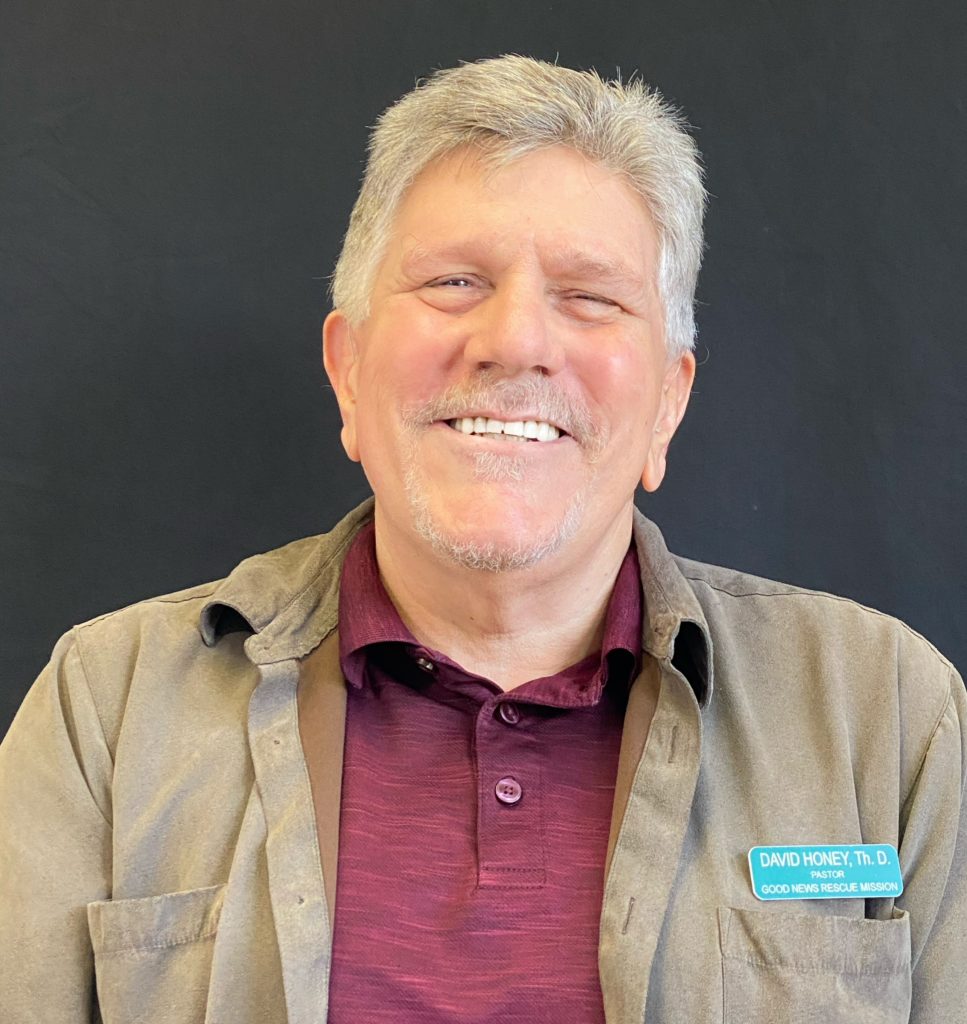Pastor Dave Honey: 8,030 God Encounters in 22 Years
Pastor Dave Honey: 8,030 God Encounters in 22 Years: There’s a Miracle in That Math
“For the past 22 years that I’ve been at the Mission, I’ve never seen God not be here. If you keep your eyes open, you’ll see a miracle at least once a day.”
Twenty-three years ago, Dave Honey was getting rid of pests. That was seven years of killing cockroaches, spraying spiders and trapping rodents while working in the pest control business. How that prepared him for a career of helping a marginalized population that most people think of as “pests” is anyone’s guess. He does know this: God uses anything and everything to get us where we need to be.
Honey has always had a heart for the homeless. When he was just a teen living in Santa Monica, he hung out with street kids. When you ask him why he chose to do that, he says simply, “I loved being with them. They were some of the most genuine people I knew. I had grown up in a pretty protected environment, so the idea that kids my age would have been used and abused by their own families was pretty shocking to me. It gave me instant empathy for them.”
“Fun, Fun, Fun” Until…
That innate desire to help the downtrodden would, in a roundabout way, end up saving Honey’s life. It was 1971 and a typical sunny afternoon in SoCal paradise when Honey made plans to go cruising with his buddies to the surfin’ sounds of the Beach Boys. It was “fun, fun, fun” until something—or Someone—took his plans away—right after he heard a voice tell him, “Absolutely do not go! Do not go!”
Freaked out, and feeling he had no other choice but to obey the voice, Honey headed to the Santa Monica pier to hang out with his homeless friends. Instead, he ended up sitting on the pier by himself. For four hours, he was overcome by an inexplicable feeling of dread.

When he finally returned home, his family came unhinged. “We thought you were dead!” his mother screamed as he walked through the door. She then gave him the bad news: All four of his friends had been involved in a head-on collision. His best friend had died instantly.
Decades later, Honey would move to Redding on a work-related transfer. Not long after that, he began attending North Valley Baptist Church under the leadership of Pastor Royal Blue. Within weeks, at age 30, Honey finally met the man behind the mysterious Voice that had saved his life as a teen. He’s been following that Voice ever since.
In 1998, Honey, who was working on his ministry credentials at the time, decided to accept a full-time position at the Mission as Good News’ first Guest Services Manager. During those early years, Honey was doing pretty much everything that needed to be done. And most of it, in one form or the other, involved touching lives beaten down by poverty, addiction and abuse.

A Preschooler’s Premonition
Honey’s call to ministry had actually begun at the tender age of four. While most four-year-old boys were dreaming of Tonka trucks and GI Joes, Honey was hearing from Heaven as he lay sleeping. “One night I had a dream where I was standing in a driveway as an adult dressed in black slacks and a white dress shirt,” recalls Honey. “Suddenly, I had this strong, indescribable feeling swirling around me that I was going to serve God in some way. Despite all the many detours I took, that dream never left me.”
Honey went through several other transitions at the Mission before finally settling into the role of the Mission’s pastor. He then took on another role outside of the Mission: that of a prison chaplain. It wasn’t unusual for him to see some of the same people he had ministered to in jail come to the Mission for services—enabling the pastoral relationship he had established with the men and women at the jail to continue. He didn’t want them to feel spiritually stranded.
Through a Glass Darkly
Sadly, not everyone would, or does, reap the benefit of Pastor Honey’s spiritual guidance. Despite his many warnings, some choose a different route—a few with irreversible consequences.
“I warn the inmates and people at the Mission about what I call ‘the glass doors.’ I’m referring to the courthouse on West Street. And I tell them, ‘When you go through those glass doors, out on that front landing of the jailhouse, just imagine that there’s a lion going back and forth, to and fro. That’s Satan out there. And he’s wanting to take you back.’”
That “lion” has “taken back” more than a few at the Mission—enough to grieve any pastor’s heart. He recalls the day a particular young man, having just been released to the care of the Mission after getting out of jail, immediately made a beeline to a van parked in front of the courthouse. Honey and two other Mission staff members stood on the court steps and watched as the young man climbed into the van occupied by his druggie friends and disappeared—never to be seen again. Not long after that, the young man died of a drug overdose.

People often ask Honey, “Do you ever get demoralized over those repeated failures?” It’s a natural question and one that he has a ready answer for. “We deal with that reality every day: People leave, people break down, people self-sabotage, people die,” says Honey. “And we all know that and understand that. But the people who do that—who leave because they think they know so much more—well, we have to let that happen. It’s heartbreaking, sure, but we can’t convince them. That’s God’s job, not yours or mine.”
Choose Your Ending
Thankfully, it’s not all tragic endings. For every sad ending (some which have yet to be written) there are also happy ones—endings that Honey loves to talk about. These are the stories of the people who have learned to make good choices. They are the men and women who left the Mission not just with a transformed heart, but also with a dream and a plan. In choosing courage over fear, selflessness over self-preservation and building a future over living in the shame of the past, they’ve turned prowling lions into kitty cats.
“There was one family, a lady, and she has three kids, a girl and two boys,” recalls Honey. “The whole family was living here at the Mission. And when she left here, she worked hard to make sure that her sons went to school and did well. One of them became a veterinarian. And that’s the power of legacy and changing not just one future, but so many others.”
One person’s transformed life can indeed impact generations. But getting to the point where others can see that change usually takes more than a bended knee and a quick prayer. As the saying goes, “The Spirit of God won’t take you where your character can’t keep you.” This is especially true of those who have come from the sort of troubled backgrounds most of us can’t even imagine. For them, Christian discipleship must be taken to a whole new level.

More Than a Prayer
Christ gives us a new spirit, but there is still the soul—the mind, will and emotions—we have to deal with. And working through those issues, especially ones involving childhood trauma, sexual abuse, minds messed up from drugs, etc., takes more than a “say a prayer and be on your way” sort of approach. It takes hard work. It takes soul searching. It takes vulnerability and humility. It takes committing to being “transformed by the renewal of your mind” through studying God’s Word and sitting under the wise counsel of seasoned mentors and pastors—including those who have been down that same road themselves. As the saying goes, “It takes one to know one.”

This kind of community—that feeling of family—is huge. There’s nothing like iron sharpening iron and close daily interaction with fellow Jesus lovers who are committed to see you grow into the man or woman God intended you to be. This is what helps change a person from the inside out. Most of the homeless and/or addicted who are trying to overcome their past need a lot more than just a Sunday or even a Sunday and mid-week service to put them on the straight and narrow. They need unconditional acceptance, constant encouragement, zero judgment and yes, structure and boundaries as well. And that only happens in the context of community.
“It’s a horrible thing when, for example, you have a young man growing up, and he’s being say, abused and beaten by a drug addicted father, and his mom isn’t doing anything about it,” says Honey. “So naturally, this kid grows up living out what he’s been taught. And to be able to help break that cycle through the kind of community we have here—that has Jesus as the center of it all—well, there’s no greater joy than that.”
When Pain Becomes Personal
It hasn’t always been a joy for Honey. Besides experiencing the loss of people at the Mission, Honey has dealt with his own personal tragedy. At the age of 32, his daughter died of complications from heroin use. He recalls how her decline into that dark world began: with an unexplainable bent towards “bad boys”—and all that surrounded that.

He cannot tell you exactly how that happened. There was no abuse, only constant affirmation and love in the home. Father and daughter had a good relationship. Even in the midst of her addiction, she would come to the Mission—covered in sores from both the drugs and living on the street—to talk to her father. But there was a predisposition, it seems, towards the dark side—one stemming from a basic insecurity, Honey believes. “My daughter used to say, ‘Daddy, I just don’t know why, but I’m attracted to the poison.’”
Not only did Honey’s tragedy create a hole in his father’s heart, it also shows that even kids coming from happy, healthy homes can go astray. That lion outside walking to and fro doesn’t discriminate—he’s an equal opportunity destroyer. But God doesn’t discriminate either. “He who comes to me, I will never reject,” we read in John 6: 37. He’s also “near to the brokenhearted.” It’s why Pastor Honey sees miracles everyday at the Mission. Because God is there—among the invisible people. And if anyone knows the pain of loss and grief, it’s him.
“I know that God has put me here for a reason. To help people step out of their shame—to say to them listen, you’re in this kind of subculture that the world disdains. You’re invisible to them, but you’re not invisible to God. And you’re not invisible to me and your fellow sisters and brothers here. And I love you, they love you, but most importantly, Jesus loves you. He rescued you and He put us, he put me, here to help lift you out of your bondage.”

A Rag Tag Army
Before coming to Redding, Honey was climbing the proverbial corporate ladder. But that ladder, as he would soon come to realize, had more than a few termites eating away at it—making his career ambitions more rickety than promising. Going into pest control seemed a fitting segue.
Both the geographical change and the career move proved to be the right decision at the right time. But rarely do such revelations come to us before taking that requisite leap of faith (If only). “Go out from your country, and from your relatives, and from your father’s house, to the land that I will show you”(Gen. 12:1) is an inspiring verse, but it’s not how most of us hear from the Lord. Often we make big decisions on little more than a God whisper and a hunch. Just as often, they feel like a detour.
Eventually, the dream Honey had at just four years of age about serving God came back to him and he stepped into a very different future. Working at the Mission has had its ups and downs; however, it’s a journey that has taken him to the heights not of power, but of privilege—the privilege of serving the misfits and the outcasts of life that God sees as an army in the making—David’s army. “All those who were in distress or in debt or discontented gathered around him, and he became their leader” (I Sam. 22:2). Pastor David Honey is such a leader.
“Just as the Lord has been so very strategic in my life—from inexplicably drawing me to the homeless in SoCal as a teen, to saving me from dying in a car crash at age 14 and even redeeming a tragic event like my daughter dying from the effects of heroin, God has strategically placed this mission right where it is. Filling someone’s belly and giving them a bed are definitely needed, but those things don’t change a person’s heart—they can only satisfy them for a day. But when they come to know Jesus here at the Mission, well that’s an eternal benefit. And I feel honored to serve a community of the lost and the least—the people who God sees when no one else does.”
-by Jenni Keast
About the Author:
Jenni Keast is our marketing content coordinator and a lover of jean jackets, the Great Outdoors, photography and all things mid-century. Her favorite authors are Holy Spirit (the Bible) G.K. Chesterson, C.S. Lewis, Leif Enger and Walter Isaacson, to name just a few.



